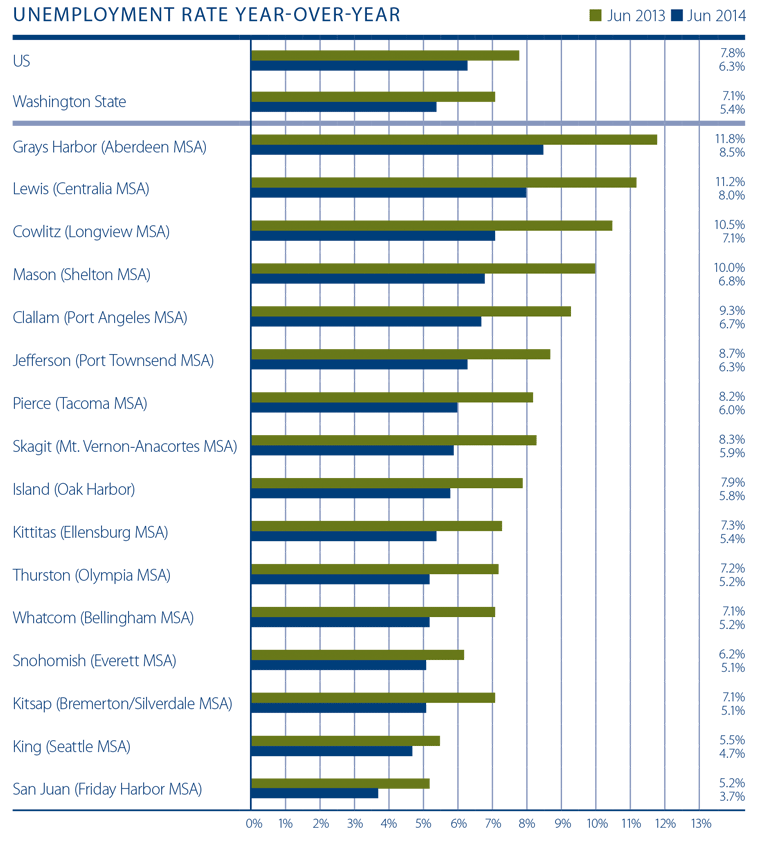Windermere Real Estate is proud to partner with Gardner Economics on this analysis of the Western Washington real estate market. This report is designed to offer insight into the realities of the housing market. Numbers alone do not always give an accurate picture of local economic conditions; therefore our goal is to provide an explanation of what the statistics mean and how they impact the Western Washington housing economy. We hope that this information may assist you with making an informed real estate decision. For further information about the real estate market in your area, please contact your Windermere agent.
Regional Economics
The post-recession job recovery continues unabated in Western Washington, with all of the counties contained within this report either exceeding their pre-recession peak or approaching it. Washington State added just shy of 84,700 jobs over the past 12-month period, representing a very respectable annual growth rate of 2.8 percent. In total, all of the counties covered added 64,190 jobs (also a 2.8 percent increase over a year ago). If there was a spring bump, it certainly came in the second quarter, with the area adding 52,180 jobs.
The tri-county area of King, Snohomish, and Pierce Counties still dominates in terms of total growth, adding 42,400 jobs in second quarter—an increase of 60,300 jobs compared to a year ago. King County employment is now four percent higher than its pre-recession peak; Snohomish is one percent higher, and Pierce County now matches its 2008 peak employment numbers.
Looking more closely at the county figures, King County (+4.0%) maintains its top position in terms of employment growth; this is followed by Pierce County (+3.5%), and Cowlitz County which continues to outperform with the addition of 800 jobs (+2.2%).
In Western Washington, losses were seen only in Grays Harbor County which shed 180 jobs over the past year. That said, this county added 720 jobs in second quarter indicating a quite substantial turnaround. Employment in Jefferson and Kitsap Counties matched that seen a year ago but, again, both counties added jobs in the quarter.
Turning our attention to unemployment rates in the region, I am not surprised to see all counties showing improvement in total unemployment. This is particularly important because the labor force grew over the past year, albeit modestly. What this means is that the drop in the unemployment rate is a function of job creation and not a slowdown in people looking for work.
When compared to June of 2013, the greatest declines in the unemployment rate were in Cowlitz County where the rate dropped by 3.4 percent to 7.1 percent. This was followed by Grays Harbor County where the rate dropped from 11.8 to 8.5 percent. Unemployment dropped by 3.2 percent in Mason and Lewis Counties. The unemployment rate in counties throughout Western Washington also improved when compared to last quarter.
Thus far in 2014, employment growth has exceeded my expectations; however, the growth is still bifurcated with very solid expansion in the core central Puget Sound area, but not necessarily across the entire state. Because of this, I am maintaining the “B+” grade that I have given the employment situation for the past year.
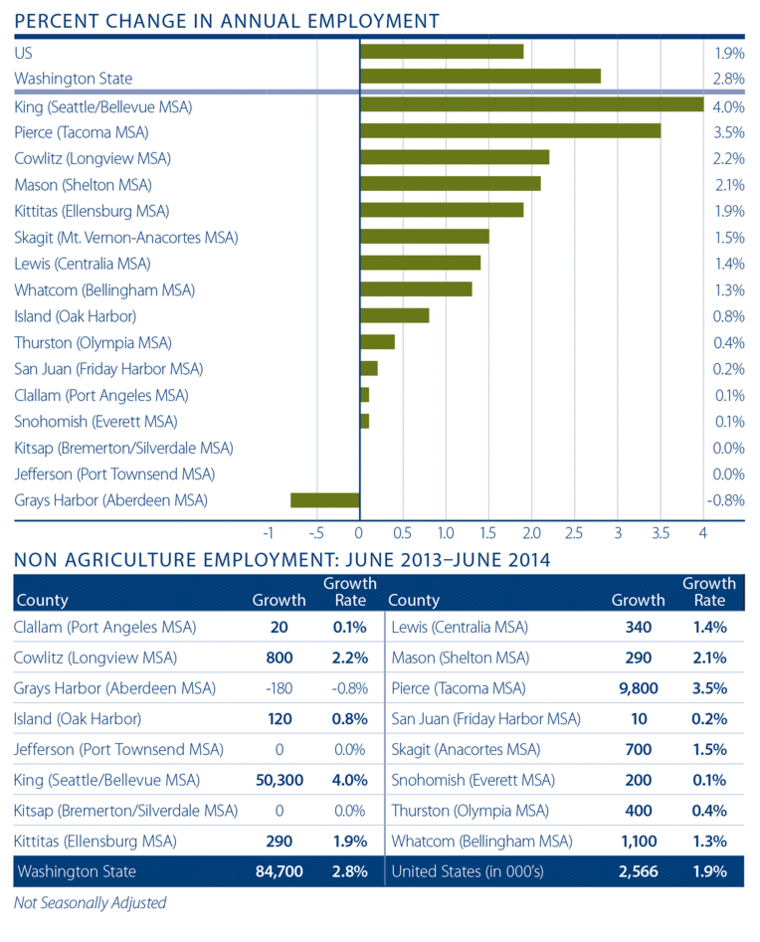
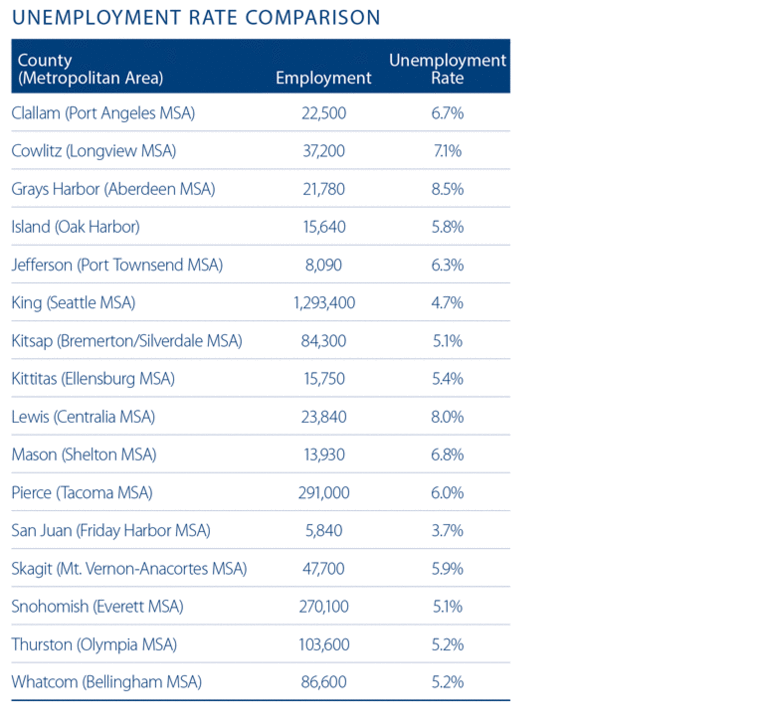
Regional Real Estate
In my first quarter report, I suggested that I was disappointed with the number of homes for sale and hoped that we would see improvement in inventory levels as we moved further into the spring selling season. Well, I am happy to report that my hopes were met, with a 33 percent increase in housing inventory compared to last quarter—and a 7.7 percent increase over a year ago.
The greatest growth in listings year-over-year was seen in Snohomish County, registering a 36 percent increase in homes for sale. This was followed by Thurston County where the total number of homes for sale was 25 percent higher than a year ago, and Pierce County rounded out the top three with a 21 percent increase. Only three counties reported an annual decrease in listing activity during second quarter. The largest decline was seen in Jefferson County (-13%), while Island and Lewis Counties both dropped by 10 percent.
When comparing first and second quarters of this year, every county reported more homes for sale. The greatest increase was seen in Kittitas County where inventory levels grew by 50 percent. This was followed by Whatcom (+44%), King (+41%), and Thurston (+40%) Counties. The smallest increase was seen in Lewis County at a still respectable 14 percent increase over first quarter of this year.
When we look at sales activity, 29,885 homes sold in the first half of 2014—a modest increase of 1.3 percent over the first half of 2013. However, during second quarter, sales growth followed the rise in listings, reporting a substantial 51.8 percent increase compared to first quarter. In the second quarter, there were over 18,000 home sales—compared to 11,870 last quarter.
Year-to-date, home sales grew the fastest in San Juan County (+69.7%), possibly suggesting that the vacation home market may have recovered. This was followed by Grays Harbor County (+34.5%) and Mason County (+28.1%).
There were four counties where home sales fell compared to the first half of 2013: Clallam County (-2.7%), Whatcom County (-2.4%), King County (-2.3%), and Skagit County (-1.5%). I believe these numbers to be due to the low inventory levels.
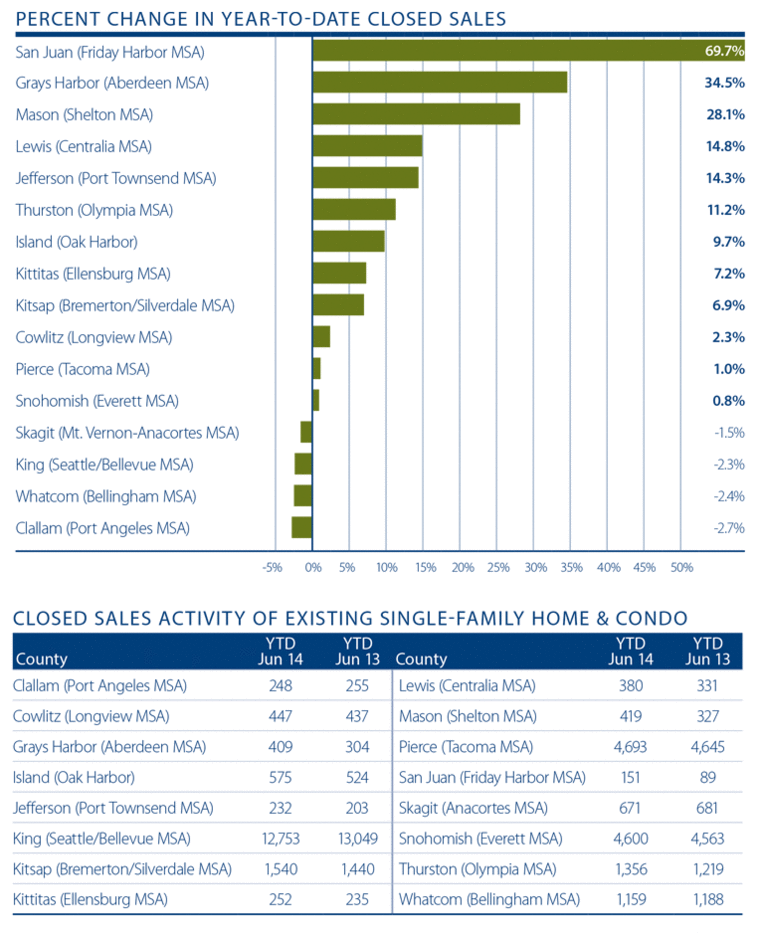
As mentioned earlier, when compared to the first quarter of 2014, home sales were solidly higher. This growth was most pronounced in San Juan County where sales were up by a substantial 85 percent. This was followed by King County (+61%), Skagit County (+58%), and Mason County (+54%). The slowest sales growth was seen in Grays Harbor County (+9%).
The average home price in Western Washington in the first half of 2014 was $355,335—up by 4.6 percent over the first half of 2013. As is seen in the chart to the right, all but four counties saw average sales prices rise compared to a year ago. Price growth has been tapering over the past year, but remains generally positive.
When we look at individual counties, the strongest annual gains were in Lewis County where prices rose by 9.7 percent. There were also significant gains seen in Snohomish County (+7.9%), Island County (+7.3%), King County (+7.2%), and Clallam County (+7%).
Compared to the first quarter of 2014, home prices were also higher in all but one county. The greatest growth was seen in Jefferson County (+14.7%), followed by Mason County (+13.8%) and Cowlitz County (+12%). There were an additional three counties that saw double-digit gains in sale prices. Home prices fell in just one county, and this was the always-volatile San Juan County, where prices for the quarter were down by 3.9 percent.
Even though rising home prices slowed in the second quarter, I am very pleased to see the growth in listing activity. As such, it’s time to up the grade for the housing market to a “B+” from the “B” grade given last quarter.
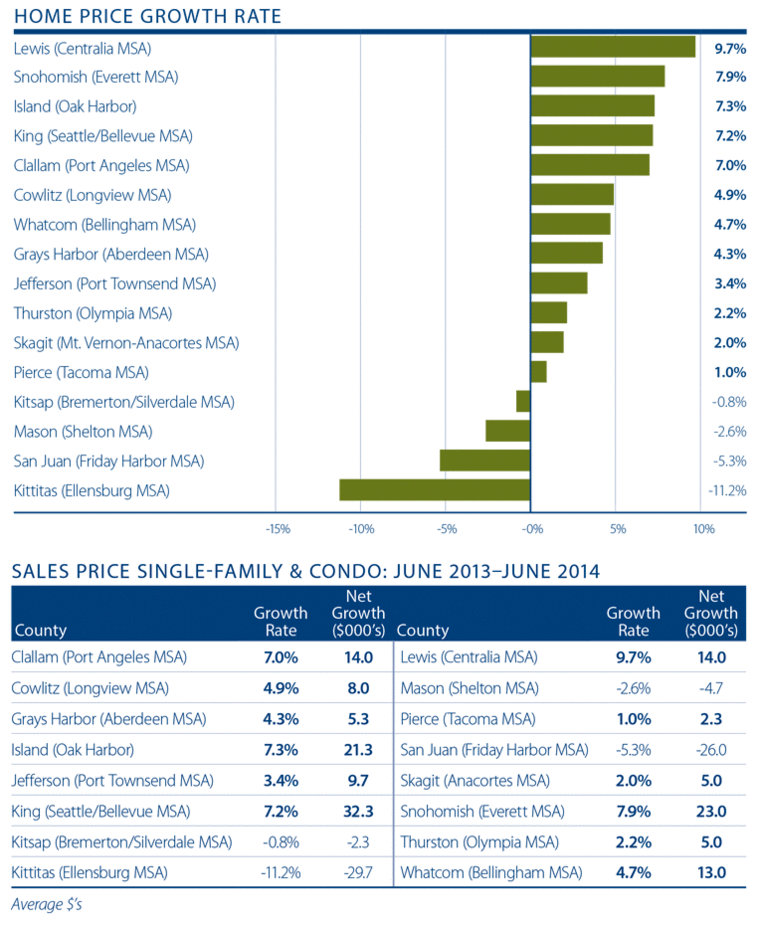
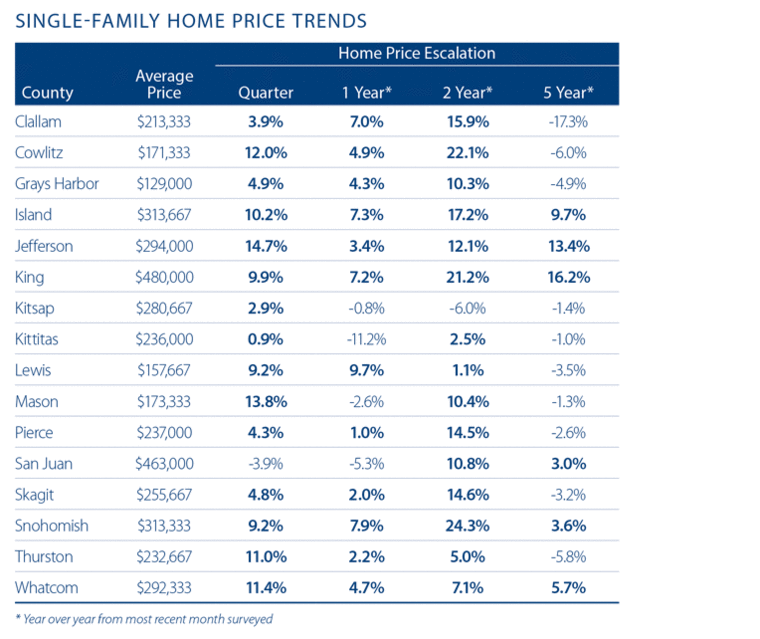
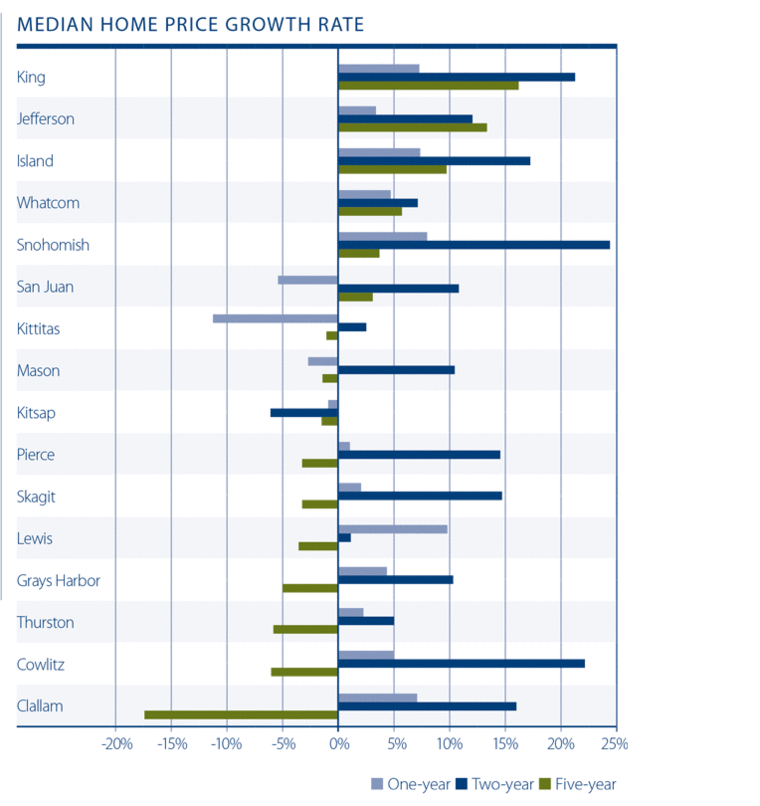
Conclusions
The economy in our region continues to improve. The ongoing low-interest rate policy of the Federal Reserve has helped fuel a turnaround in the housing market. Even with the increases in mortgage rates last summer, financing costs remain well below historical averages, with the 30-year fixed-rate mortgage averaging 4.2 percent in the second quarter of this year. Rates have dropped through the quarter and I do not expect to see any form of rapid rise through the summer months. That said, I do anticipate that interest rates will start to climb modestly through the balance of this year and into 2015.
Shifting to the new construction housing market, I have a cautiously optimistic view for economic growth in the next few years. With the exception of multifamily rentals, the new home sector remains well below potential, and will likely persist in that state for a couple of years, but continue to doggedly improve. Interestingly, the lack of new home construction bodes well for the resale market, as I expect that we will start to see additional demand coming from new households moving out of rental housing and into homeownership. This will lead to additional demand for single-family homes.
The housing market is starting to get more balanced, thanks to slowing price growth combined with somewhat greater choices for buyers. That said, we still have a long way to go. To give you some perspective, there were 33,258 homes for sale in Western Washington in June of 2009, and in June of 2014, there were just 20,670!
I expect that the summer will continue to be good to us with higher levels of inventory leading to further increases in sales activity. Mortgage lending has started, at long last, to become modestly easier, which will also do its part to add to the continued improvement of the housing market and the overall economy.
 About Matthew Gardner
About Matthew Gardner
Mr. Gardner is a land use economist and principal with Gardner Economics and is considered by many to be one of the foremost real estate analysts in the Pacific Northwest.
In addition to managing his consulting practice, Mr. Gardner chairs the Board of Trustees at the Washington Center for Real Estate Research at the University of Washington; sits on the Urban Land Institutes Technical Assistance Panel; is an Advisory Board Member for the Runstad Center for Real Estate Studies at the University of Washington; and is the Editor of the Washington State University’s Central Puget Sound Real Estate Research Report.
He is also the retained economist for the Master Builders Association of King & Snohomish Counties. He has twenty-five years of professional experience in the U.K. and U.S.
He has appeared on CNN, NBC and NPR news services to discuss real estate issues, and is regularly cited in the Wall Street Journal and all local media.
 Facebook
Facebook
 X
X
 Pinterest
Pinterest
 Copy Link
Copy Link
